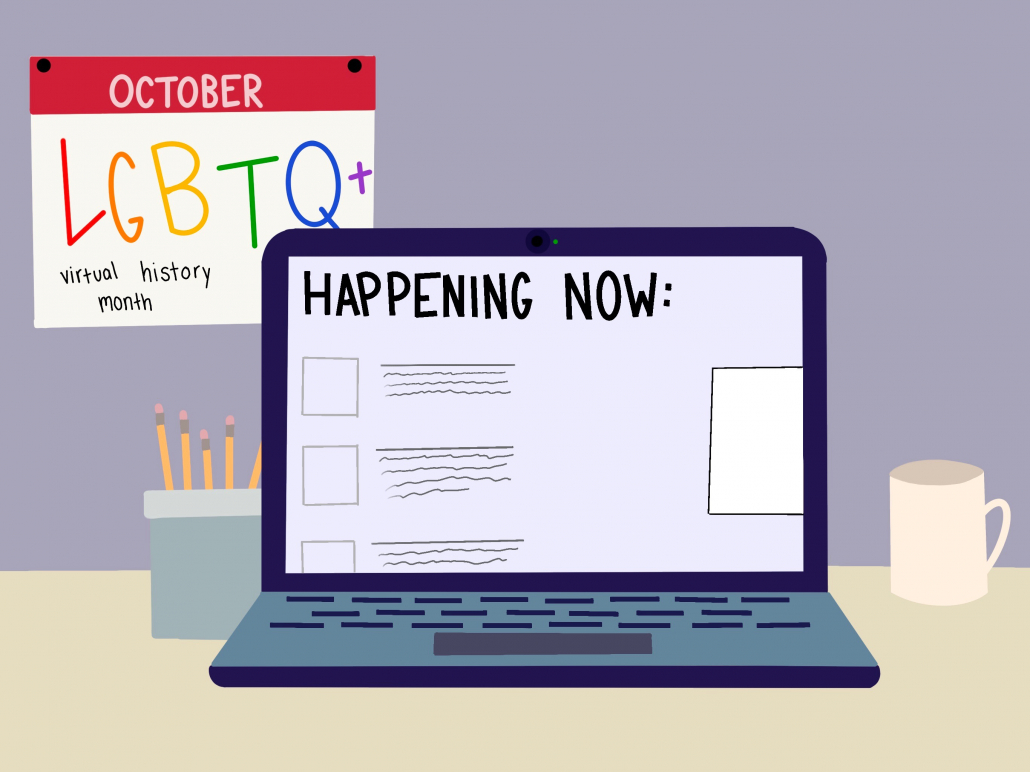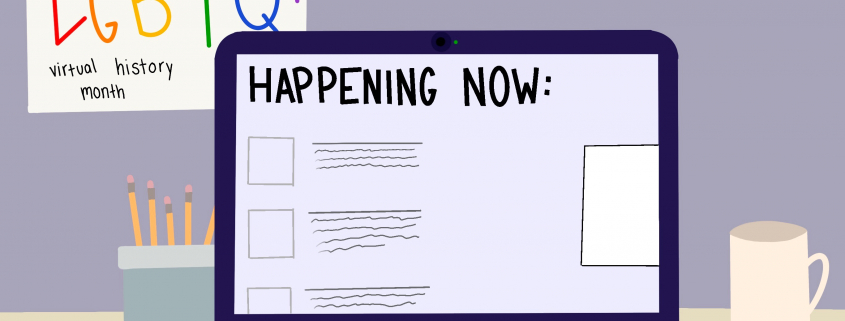USC celebrates LGBTQ+ History Month virtually

In previous in-person semesters, the USC community was able to celebrate LGBTQ+ History Month by attending open mic nights at Ground Zero and even taking in the various banners dedicated to the month hanging on Trousdale Parkway.
However, this semester, USC and the LGBTQ+ Student Center have continued to celebrate LGBTQ+ history month — a month dedicated to celebrating the historic achievements of the LGBTQ+ movement in the United States — in a completely virtual setting.
To accommodate the new environment, this year’s events include virtual guest speakers, a creative writing workshop to share LGBTQ+ stories, the observation of Intersex Awareness Day and more. The month also includes collaborations with cultural organizations including the Student Assembly for Gender Empowerment and the Asian Pacific American Student Assembly on the intersection of different social identities.
Michael Oliveira, an archivist at the USC ONE Archives, the largest repository of LGBTQ+ materials in the world, said LGBTQ+ History Month is about sharing the narrative of the people within the community.
“It’s about raising awareness, creating allies, creating understanding. The LGBTQ movement has been tremendously successful because it has used many of the same tactics that the anti-war movement, the African American civil rights movement, the women’s movement … in order to advance equality,” Oliveira said. “We hope that people look at this and see that the movement is very much part of their life.”
Steven Vargas, a graduate student studying specialized journalism and former executive director of Queer and Ally Student Assembly, who has been actively involved in the LGBTQ+ Student Center since his freshman year, said that learning from the history of the movement is important for present members of the LGBTQ+ community. As a queer person of color, Vargas said he recognized the importance of establishing a safe space for his identity.
“I think that History Month is important in highlighting how we got here because this current generation [of LGBTQ+ individuals] lives their current identity a lot differently than the past generation,” Vargas said. “I think acknowledging how we got to this moment in time where we have a better sense of safety while expressing our queer identity is important.”
Christina Belcher, a professor at the USC Writing Program and the department of Gender and Sexuality Studies, hosted Coming Out Narrative: A Creative Non-Fiction Craft Workshop, a writing workshop for participants to write about their LGBTQ+ identity and coming out story in the context of their own unique social and cultural background. The event also provided writing prompts to participants, who were encouraged to later share their stories.
“I think that [participants] really give us insight into the nature of homophobia, religion, looking for community, looking for acceptance, and that can be both really difficult but also really liberatory and something to be celebrated,” Belcher said.
For Anna Randall, a junior majoring in cinema and media studies and the co-chair of USC QuASA Pride Fest, celebrating LGBTQ+ History Month has played a major part in her time with the movement since she came out in 2015.
“I think LGBTQ+ History Month is really important to recognize and bring awareness to because that is how queer identities become accepted and [it’s] how we create allies,” Randall said.
Despite being conducted in a virtual setting, Randall said the responses among students to LGBTQ+ History Month have increased with more student engagement, even from those who do not identify as LGBTQ+.
“I think being virtual has actually really helped students access resources, because it can be difficult to find resources on campus if you don’t really know where you’re supposed to be looking,” Randall said. “I feel like even our meetings and being social have also benefited from being online because it gives people the ability to do it from the safety of a private room.”
Although USC’s LGBTQ+ History Month has provided students a safe space to express themselves, Vargas said he believes that USC still has room for improvement.
“USC has taken some efforts in acknowledging the need for equity and inclusivity within its campus, but I don’t know if it’s really taking the efforts to do so,” Vargas said. “For example, they’ll put out a statement, but what does that statement do? What do these forums really do without actually putting in the effort into even the smallest things within classrooms and within different social spaces?”
With the upcoming election and political climate, Randall said she believes LGBTQ+ History Month has a larger role now more than ever.
“There’s a lot of political conflict, and unfortunately, queer identities are, apparently, a “topic for debate” in politics, which is really unfortunate considering that these are people’s lives. You can’t help your identity. You can’t help your gender identity or your sexuality, it’s a part of who you are,” Randall said. “It’s important to educate people who do not know much about the [LGBTQ+] community and what we’ve fought for and what we’re still struggling with today in terms of acceptance and allyship.”

